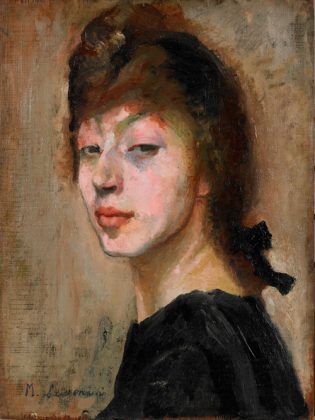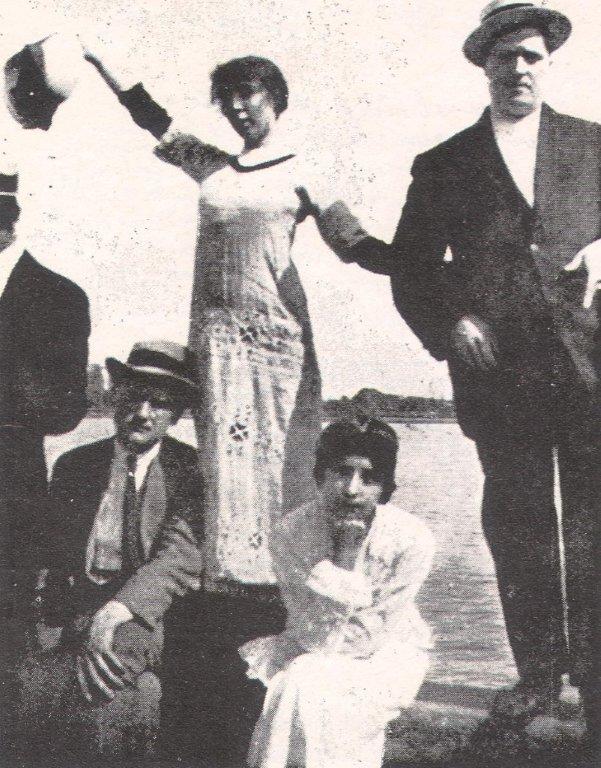Άγγελος Σικελιανός Το τραγούδι της Καλυψώς
Το ευρύχωρο άντρο γέμιζεν από τα κυπαρίσσια
μιαν ήρεμη ευωδιά,
κι από των ξέρηχων φυκιών την ακροπελαγίσια
πνοήν η θεία βραδιά…
Έτσι, ως μπροστά της έπλεχε μια κι άλληνε πλεξούδα
γιομάτη και χρυσή,
αργά, το ηλιοβασίλεμα, η Νύφη ορτή ετραγούδα,
και βόγκαε το νησί…
Και καθώς πλέρια, στα πυκνά του δάσου, αχτίδα νά μπει
στο γέρσιμο του ηλιού,
μέσα της ξάφνου απόκρυφος χορός φτεράει και λάμπει
σα διάνεμα πουλιού,
κι απ’ την ισκιά ζερβόδεξα, στων μούσκλων τα βελούδα
αν ακουμπά ο κρουνός,
άγνωρη ανάβρα ολόγυρα σαλεύει η πεταλούδα,
και κόσμος εαρινός
μ’ ανεβρυτό περνάει φτερό κι ανεβοκατεβαίνει
στη φλόγινη αστραπή
χρυσός, πρασινογάλανος, φωτιά, σε μαγεμένη
διαβατική σιωπή·
κι όπως, αν γείρει στ’ ανοιχτά, σε πέλαγο ή σε κάμπο,
τα πάντα διαπερνά,
τα ξερά ’γκάθια, διάφωτα, με κρουσταλλένιο λάμπο,
σαλεύουν φωτεινά·
τ’ άσπρα τα πέλαα των σταχυών και τα βουνά, τελειώνει
με διαμαντένια ακμή,
κι η αχτίδα σα βροχόσταλα στου πεύκου το βελόνι
γλιστράει κάθε στιγμή·
τ’ άγριο το κύμα, ως τ’ άλογο που ορτώθη στα καπούλια
κρεμάει, κι από ψηλά
σα βρύση αφήνει τον αφρόν από άμετρα κανούλια
φλογάτος να κυλά—
έτσι απ’ την άκρατη λαμπρή φωνήν ό,τι διαβαίνει
διαβαίνει δίχως σκιά,
και στης αθάνατης χαράς τον ήλιον ανεβαίνει
που τραγουδά η θεά,
και μ’ άγνωρο βαθύ παλμό τριγύρα σταματάνε
στη βαθουλή σπηλιά
τ’ αλάφια· Διοκατέβατα, να ποτιστούνε ως πάνε,
και τα τρανά πουλιά…
«Λαμπρέ θνητέ, σε χαιρετώ… Σου θέρισε σα στάχυα
τα κύματα μακριά
η ευκή μου, και τραβήχτηκε πάνω απ’ τα μαύρα βράχια
η θλιβερή σου σκιά…
»Με το καλόν οπὄφυγες και πια δε σου προσμένω
τα μέλη τα γερά,
οπὄσβηνα τον πόθο τους σα σίδερο αναμμένο
μέσα στα κρύα νερά…
»Μαζί σου, αν γεύτηκα, θνητέ, της γης αδρό το μέλι
στη βαθουλή σπηλιά,
των Ολυμπίων τον έρωτα κι αν ένιωσες στα μέλη
σε αργόπορη αγκαλιά,
»δε χάρηκες μ’ ελεύτερη καρδιά, με αστρίτη μάτι
τη θεϊκή μου ορμή
που ως κύμα εγλίστρα απάνω σου, κι η νοσταλγία σ’ επάτει
για μιας θνητής κορμί;
»Όμως έτσ’ είναι η μοίρα σας… Με τα έργα σας μεθάτε·
και μόνη σας χαρά,
της λιγοστής σας δύναμης που εδόθη, να λυγάτε
στην έγνοια τα φτερά…
»Ω, πόσο ήταν λαμπρότερο το μέγα σου το τόξο
πά’ στ’ αργυρό καρφί,
σαν από κάθε πάλεμα και κάθε οργήν απόξω,
με μια αρετή κρυφή
»έδειχν’ ορμήν ανώτερη κι απ’ την ορμή του Ευρύτου,
ως άνεμος σφοδρός
τ’ άγγιζε, κι ήχος έβγαινεν αργός απ’ τη νευρή του,
ήχος γλυκός κι αδρός.
»σαν όλο το μουρμουρητό του πέλαου στ’ ακρογιάλι
την πρωινή ερημιά,
κι ήταν η βούληση μια ευκή, μιαν άγια γνώρα η πάλη,
η νίκη επιθυμιά…
»Κι ο θάνατος οπὄδινε με τα γοργά του βέλη
σα μάχονταν τη ζωή,
του πιο ψηλού θερίζοντας στου ενάντιου την αγέλη
την ξαναμμένη πνοή,
»καθώς η μέλισσα έμοιαζε που, αν μπήξει το κεντρί της,
και η ίδια θα χαθεί…
Κι εσύ, που για την κλίνη μου είχες, γυμνός αντρίτης,
πετάξει το σπαθί,
»στης λήθης ελουζόσουνα τη δύναμη την πρώτη
όπου αναβράει κρυφή,
να σε ποτίσει αθάνατη κι αστέρευτη μια νιότη,
της σάρκας μου η αφή…
»Όμως έτσι’ είναι η μοίρα σας… Με τα έργα σας μεθάτε.
και μόνη σας χαρά,
της λιγοστής σας δύναμης, που δόθη, να λυγάτε
στην έγνοια τα φτερά…
»Λαμπρέ θνητέ, σε χαιρετώ. Τώρα η βαθιά μου κλίνη,
στρωμένη πάντα πλιο,
με τα σεντόνια που ύφανα μ’ αθάνατη γαλήνη
στον πέτρινο αργαλειό,
»να μου κρατούνε τη δροσιά και να την ξανανιώνουν
σαν του πελάου αφρό
κι ωσάν από τα κύματα τον ύπνο μου να ζώνουν
μ’ ανάσασμα αλαφρό,
»την πιθυμιά σου δεν κρατεί μηδ’ όσο τ’ άσπρο αυλάκι
π’ αφήνει όπως περά
καράβι γοργοτάξιδο ξοπίσω από το δοιάκι
στα ολόμαυρα νερά…
»Πώς τη γαλήνη της νυχτός των Ολυμπίων τελειώνει
του γκιώνη αργή φωνή,
οπού απαντάει, αντίλαλος του μικρού, σ’ άλλου γκιώνη
τον πόθο αλαργινή,
»έτσι σε κύκλο αθάνατο ο αιώνιος πόθος δένει
το πνέμα φωτεινό,
κι απ’ την ευκή μεστότερος, ο αντίλογος πλουταίνει
τον άσωτο ουρανό…
»Σα λεύκα αν σειέται ο πόθος μου και στην οκνήν ημέρα
που αγέρας δε φυσά,
με τ’ αλαφρό το σείσμα μου πιότερο σέρνω αγέρα
στα σπλάχνα και δροσιά,
»κι όπως τη δίψα μου καλούν, αραδικώς, σα θρόνοι
οι αστέρευτοι κρουνοί,
όμοια περνάει ατέλειωτη, χωρίς να με σκλαβώνει,
το νου μου η ηδονή…»
***
Έτσι τραγούδησεν η θεά με τη φωνή την πλέρια
την ολυμπία βραδιά,
στον ηχηρόν ορίζοντα, που επάλλονταν τ’ αστέρια,
να λούσει την καρδιά…
Calypso’s Song
The cave was spacious, and the mighty cypresses
Filled it with tranquil musk,
As breath of clacking seaweed from sea-boundaries
Scented the holy dusk.
Plaiting her thick and golden tresses forward hanging,
One woven over one,
Slow, as the sun went down, the nymph stood singing,
And all the isle made moan;
And, as the sunbeams penetrate a dense, wild wood
When the day dies, there stirred
A sudden secret dance in her, that flared and glowed
Like flutterings of a bird;
Or as through shade to left and right, on velvet moss
A pure stream bubbles by,
And there the light-aired glory of the springtime goes,
Cavorting butterfly,
Carried away on surging wings that soar and dive
Quick as a lightning-flash,
Golden, green-blue, and luminous, through fugitive
Enchanted noiselessness;
As, should it turn itself to wide expanse to rove
On open sea or plain,
The dry transparent thorns, illuminated, move,
Glistening crystalline;
It tips the corn’s white waves, it tips the mountainsides,
With a diamond tip-top;
Momently on the pine-needle the sunbeam glides,
Now, now, like a raindrop;
The savage wave which, as a horse rears on its haunches
Hangs in air, from a height
Lets foam run down in countless rivulets, and launches
A wellspring, fiery-bright; -
Just so, the course of her wild shining melody
Runs where no shade can lie,
And, as the goddess sings immortal ecstasy,
Into that sun climbs high;
And in the hollow caves, with deepest inner quaking,
The deer stand round, stock-still,
That left the heights of Zeus, to seek for their thirst’s slaking;
The fine-plumed birds, as well.
“Farewell, you shining mortal man! Like sheaves of corn
Harvested by my prayer,
The distant waves hauled up your troubled shadow, thrown
On the black rocky shore.
“Now you depart in freedom; I no longer yearn
Those sturdy limbs to hold,
I who extinguished your desire like glowing iron
In waters fresh and cold...
“If you and I have shared the earth’s thick-honey taste,
Mortal, deep in the cave,
If you have learned, through limbs that leisurely embraced,
How the Olympians love,
“Did you not take delight – free heart and serpent’s gaze! –
In my immortal fire
That swept you like a wave, for humankind’s caress
Rekindling your desire?
“Such is your fate. Your deeds are your strong liquor-brew:
Your only joy is pitting
Your feeble strength, the puny portion given you:
You break its wings with fretting.
“How much more glorious was your mighty battle-bow,
On silver peg impaled,
That, far from struggle or from anger, yet could show
An excellence concealed,
“Launching itself more high than flooding Eurytus,
When an ungentle wind
Touched it, and from the bowstring came harmonious
A slow substantial sound,
“Like all the murmur of the sea along the shore
In the deserted morning;
Volition was a prayer, strife was sacred lore,
And victory a yearning.
“That death it dealt, when arrows hurtled from your bow –
The fight was life and death –
It harvested the tallest of the thronging foe,
Scything their hectic breath –
“Was like a honey-bee who, driving deep her goad,
Herself is doomed to die;
And you too for my bed have hurled away your sword,
Stood stripped of weaponry;
“Then in oblivion’s primal force you took your bath,
That surges secretly;
My flesh conferred on you the eternal fount of youth,
From the warm touch of me...
“Such is your fate. Your deeds are your strong liquor-brew:
Your only joy is pitting
Your feeble strength, the puny portion given you:
You break its wings with fretting.
“Farewell, you shining mortal man! My bed is deep,
On which henceforth are strewn
Linens that I, whose calm was like immortal sleep,
Wove on my loom of stone,
“All to preserve my morning-freshness and renew,
Ocean-foam salving me,
Girding my slumber with the gentle breath of dew,
Or the waves of the sea.
“The passion of you lingers no more in my bed
Than the white furrow left
Astern in the black waters where a ship has sped,
By the helm’s rudder cleft...
“As the Olympians’ midnight calm is broken by
The owl’s unhurried call,
To which a second owl sends echoing reply,
Distant, emotional,
“So does eternal longing fix the shining breath
In an immortal ring,
And the response enriches heaven’s boundless breadth
By the prayer’s ripening...
“If like a poplar my desire is tremulous
On a slack windless day,
That trembling soothes my heart the more with cool caress,
Draws in the breezes’ play;
“Just as the ever-flowing springs, like thrones aligned,
Evoke my thirsty craving,
So too infinity of bliss outruns my mind,
Passes, without enslaving...”
***
In the Olympian twilight, so the goddess sang:
Her voice was full and strong.
The stars above were vibrant, the horizon rang:
She bathed her heart in song.

